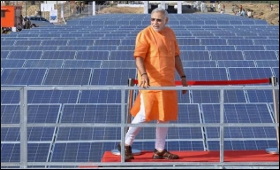|

|
ISA members pledge to use more solar power, create more jobs
|
|

|
|
| Top Stories |
 |
|
|
|
SME Times News Bureau | 12 Mar, 2018
Member states at the founding
conference of the International Solar Alliance (ISA) here on Sunday
pledged to pursue an increased share of solar energy in their overall
power consumption thereby realising the huge potential the sector offers
to create jobs and empowering poorer communities.
A three-page
'Delhi Solar Agenda' issued at the end of the conference stated that the
ISA reiterated its commitment to the 2030 UN Agenda for Sustainable
Development that calls for eradication of poverty in all its forms and
dimensions and for transforming our world in which development and
application of technology are climate-sensitive, respect biodiversity
and are resilient.
Launched by Prime Minister Narendra Modi and
then French President Francois Hollande at the Paris climate summit in
2015, the ISA was conceived as a coalition of solar resource-rich
countries to address their special energy needs and provide a platform
to collaborate on dealing with the identified gaps through a common,
agreed approach.
It is open to all 121 prospective member
countries falling between the Tropics of Cancer and Capricorn. Of these,
61 have signed the framework agreement and 32 have also submitted their
instruments of ratification.
The Agenda emphasised that "our
endeavour has the potential to achieve sustainability by generating
growth, enhancing skills, creating jobs, unleashing entrepreneurship,
fostering innovation and increasing incomes".
It acknowledged
"the importance of access by women and youth to advance knowledge and
solar energy technologies, especially in poorer communities, rural and
remote areas".
The ISA member states also agreed "to increase
their efforts to pursue an increased share of solar energy in the final
energy consumption in our respective national energy mix, as a means of
tackling global challenges of climate change and as a cost effective
solution by supporting and implementing policy initiatives and
participation of all relevant stakeholders, as applicable, in our
respective states".
The Agenda also called for facilitating
affordable finance, access to appropriate, clean and environment
friendly technology and undertaking capacity building, including forging
mutually beneficial partnerships with reputable international
institutions and reputable financial institutions for the benefit of
developing countries.
It also called for exploring innovative
financing mechanisms that can generate a sustainable market for the
deployment of cost effective solar technologies, coupled with
constructive policy initiatives to catalyse public and private
investments to reduce the cost of solar projects in developing
countries.
The member states agreed to facilitate joint research
and Development, to consider off-grid solar applications to cater to
the energy requirements of poorer and remote communities and to
facilitate awareness and skills enhancement of local communities in the
monitoring and maintenance of solar technologies.
Earlier in the
day, addressing the inaugural session of the conference, Prime Minister
Narendra Modi presented a 10-point action plan to promote the use of
solar energy.
Modi said there should be a full ecosystem for
availability and development of technology, economic resources,
development of storage technology, mass manufacturing and innovation.
He
called for concessional financing at lower risk for solar projects and
said regulatory aspects and standards should be developed to find
solutions fast.
French President Emmanuel Macron, who co-chaired
the conference with Modi, announced an additional investment of 700
million euros for global solar energy generation by 2022 to reduce the
use of fossil fuel and help combat climate change.
Without taking
US President Donald Trump's name, Macron said that while some left the
climate deal, others stayed because they wish good for their children
and grandchildren.
Under the ISA, 100 centres for excellence
would train 10,000 technicians to achieve the target of 1,000 GW of
solar energy that needs $1,000 billion, Macron said.
He lauded
India's solar commitments that has 20 GW installed solar capacity - one
of the fastest growing in the world. The country has increased its solar
power capacity by about eight times over the past four years.
India's
wind power generation capacity is 32.8 GW. It aims to achieve 175 GW of
clean energy by 2022, of which 100 GW will be solar.
|
|
|
| |
|
|
|
|
|
|
|
|
|
|
|
|
|
|
| |
| Customs Exchange Rates |
| Currency |
Import |
Export |
US Dollar
|
₹91.2
|
₹89.5 |
UK Pound
|
₹123.35
|
₹119.35 |
Euro
|
₹107
|
₹103.35 |
| Japanese
Yen |
₹57.9 |
₹56.1 |
| As on 22 Jan, 2026 |
|
|
| Daily Poll |
 |
 |
| What is your primary "Make or Break" expectation from the Finance Minister this year? |
|
|
|
|
|
| Commented Stories |
 |
|
|
|
|
|
| |
|